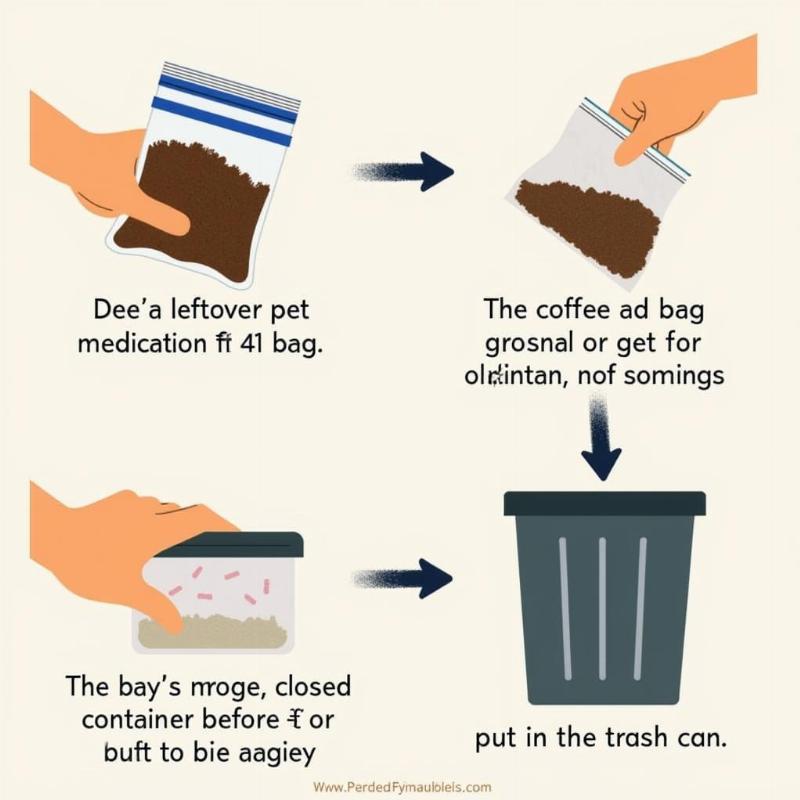Losing a beloved canine companion is a heartbreaking experience. Amidst the grief and necessary arrangements, a practical question often arises: what to do with leftover dog medication? Properly disposing of these medications is crucial for environmental safety and preventing accidental ingestion by other pets or humans. This article will guide you through the safe and responsible ways to handle unused dog medications in the United States after your dog’s passing.
Safe Disposal Methods for Pet Medications
Several options are available for safely discarding your dog’s medications, ensuring they don’t pose a risk to others or the environment. The best method often depends on the type of medication and your local resources.
Return Unused Medications to a Veterinarian or Pharmacy
Many veterinary clinics and pharmacies participate in drug take-back programs. This is often the easiest and most responsible way to dispose of unused medications, including controlled substances. Contact your veterinarian or local pharmacy to inquire about their participation in these programs.
Utilize Community Drug Take-Back Events
Many communities host periodic drug take-back events, offering a convenient way to dispose of various medications, including pet medications. Check with your local government or law enforcement agencies for information about upcoming events in your area.
Dispose of Medications in the Household Trash (as a Last Resort)
If take-back programs are unavailable, you can dispose of most pet medications in your household trash. However, this method should be used as a last resort and requires careful preparation to prevent accidental ingestion or environmental contamination.
- Mix medications with an undesirable substance: Combine the medication with an unappealing substance like used coffee grounds, kitty litter, or dirt. This makes the medication less attractive to pets or children who might rummage through the trash.
- Seal the mixture in a secure container: Place the mixture in a sealed, non-recyclable container, such as a zip-top bag or empty can. This prevents leakage and further deters access.
- Conceal the container in the trash: Place the sealed container deep within your household trash to further minimize the risk of accidental discovery.
 Disposing of Dog Medication in Trash
Disposing of Dog Medication in Trash
Medications Requiring Special Handling
Certain medications require specific disposal methods due to their potential environmental impact or risk of abuse.
Controlled Substances
Controlled substances, such as strong pain relievers, should always be returned to a veterinarian or through a drug take-back program. Never dispose of controlled substances in the household trash.
Chemotherapy Drugs
Chemotherapy drugs require extra caution due to their potent nature. Consult your veterinarian for specific disposal instructions, as they may require special handling through hazardous waste programs.
What NOT to Do with Unused Dog Medications
Avoid these practices when disposing of pet medications:
- Flushing medications down the toilet: This can contaminate water supplies and harm aquatic life.
- Throwing medications loosely in the trash: This poses a risk of accidental ingestion by children, pets, or wildlife.
- Giving unused medications to other pets: Never administer medications prescribed for one pet to another. Dosages and formulations vary, and doing so can be dangerous and even fatal.
Frequently Asked Questions
- What should I do with expired dog medication? Expired medications should be handled the same way as unused medications. Utilize a take-back program or dispose of them safely in the household trash following the guidelines outlined above.
- Can I donate unused dog medication? Donating unused medications is generally not recommended due to potential liability and safety concerns.
- What if I accidentally give my other dog the deceased dog’s medication? Contact your veterinarian immediately if accidental ingestion occurs.
Conclusion
Properly disposing of your dog’s unused medications after their passing is a responsible and crucial step. By following the guidelines outlined in this article, you can protect the environment, prevent accidental ingestion, and ensure the safety of your community. Remember to prioritize take-back programs and, when necessary, utilize the safe disposal methods for household trash.